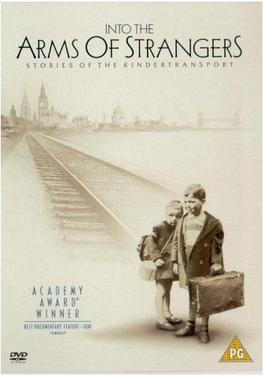I saw tonight a documentary, Into the Arms of Strangers. It focuses on the lives of 10,000 primarily Jewish children from Nazi Germany, Austria, Czechoslovakia, and the Free City of Danzig who found refuge in Great Britain. Transportation started on March 15,1939 and ended May 14, 1940 when Hitler began his invasion of the Low Countries.
The children who had to be under the age of 18 were placed in British homes, hostels, schools and farms. Sadly, only Great Britain accepted children unaccompanied by their parents. In the United States, a bill to allow Jewish children to immigrate to America, (Wagner-Rogers Bill), died in committee because of anti-Semitic opposition.
The Kindertransport was bittersweet. On the positive side, these children survived the Holocaust. On the negative side, their separation from their parents caused lifelong psychological pain, especially since they spent their adolescent years with “strangers” who did not share their mores.
Background
Five days after “Kristallnacht” “The Night of the Broken Glass, a delegation of British, Jewish and Quaker leaders appealed to the British Prime Minister, Neville Chamberlain, to permit the temporary admission of unaccompanied Jewish children.
Although for the parents separation from their children was traumatic, almost all of them recognized the mortal danger of remaining in Central Europe. To save their children’s lives, they were willing to let them immigrate to Great Britain. Sadly, only a few of the parents survived the Holocaust. Thus, children (as young as 7) never saw their parents again. In the course of the documentary, the participants retained vivid memories of their last conversations with their parents. One lady lamented that she accused “her parents of abandoning her.”
The children lived with both gentile and Jewish parents. The reasons for taking in the children varied from those seeking a child to others wanting a servant. One lady recalled her unwillingness to wear a “servant’s uniform.”
I would like to draw attention to the philanthropy and kindness of the Rothschild family. They not only gave significant funds, but provided needed work and housing for Jewish immigrants.
Trauma suffered by the Children
Many of the children suffered from extreme trauma as a consequence of their Kindertransport experience. They worried about the fate of their parents and other family members who remained in Europe. Although many of them tried very hard to be obedient and responsible, they were not certain of the love of their foster parents. They recognized they had different value system and background from their British hosts. Sadly, some English people resented “German” children being in their midst.
While younger children with blond hair and blue eyes were readily adopted, older children had difficulty finding homes. About 200 lived in orphanages for years because nobody adopted them.
The Kindertransport was well organized with adults accompanying the children. Organizers made certain that each child had some place to live.
In November 2018, the German government provided $2800 in reparation to the surviving children of the Kindertransport.
Conclusion
The holocaust will remain a stain on civilization for a millennium. Each stage of the degradation of Jews reflects badly on almost every country in central and Eastern Europe. It remains inconceivable that Jewish children were denied schooling, playing in park privileges, attendance in movie theaters, etc.
For me, it is heartbreaking to hear repeatedly the unwillingness of almost every country to accept Jews despite their plight. Instead of Jews being allowed to immigrate to the United States, Canada, and Australia, they could only get entrance into the Dominican Republic, Cuba, Shanghai, and Bolivia. It was inevitable once Nazi Germany took possession of countries housing millions of Jews, that they embraced widespread genocide.
Originally published in the Sarasota Herald-Tribune


